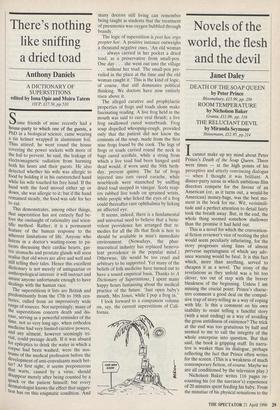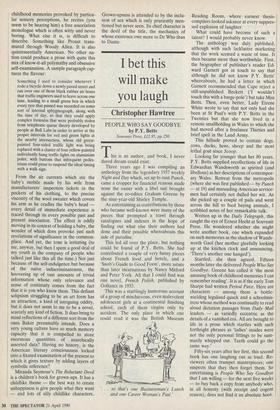Novels of the world, the flesh and the devil
Janet Daley
DEATH OF THE SOAP QUEEN by Peter Prince
Bloomsbury, £13.99, pp. 256
ROOM TEMPERATURE by Nicholson Baker
Granta, £11.99, pp. 116
THE RELUCIANT DEVIL by Miranda Seymour
Heinemann, £12.95, pp.214
Icannot make up my mind about Peter Prince's Death of the Soap Queen. There were times — at the high points of his perceptive and utterly convincing dialogue — when I thought it was brilliant. A dinner-party scene in which ambitious film directors compete for the favour of an American (or, as it turns out, a would-be American) money-bags, was the best mo- ment in the book for me. Wit, verisimili- tude and a perfect attention to detail fairly took the breath away. But, in the end, the whole thing seemed somehow shallower than the promise it had held out.
This is a novel for which the convention- al fiction reviewer's vice of reciting the plot would seem peculiarly infuriating, for the story progresses along lines of almost perverse suprisingness of which any adv- ance warning would be fatal. It is this fact which, more than anything, served to cheapen it as a novel. The irony of the revelations as they unfold was a bit too clever, too out of step with the braver bleakness of the beginning. Unless I am missing the crucial point: Prince's charac- ters comment a good deal on the compul- sive trap of story-telling as a way of coping with life. Is this a comment on his own inability to resist telling a fanciful story (with a neat ending) as a way of avoiding the gross untidiness of existence? The trick at the end was too gratuitous by half and seemed to me to call the integrity of the whole enterprise into question. But that said, the book is gripping stuff. Its narra- tive is weaker than its dialogue, perhaps reflecting the fact that Prince often writes for the screen. (This is a weakness of much contemporary fiction, of course. Maybe we are all conditioned by the television play.) Nicholson Baker writes 116 pages re- counting his (or the narrator's) experience of 20 minutes spent feeding his baby. From the minutiae of his physical sensations to the childhood memories provoked by particu- lar sensory perceptions, he recites (you seem to be hearing him) a free association monologue which is often witty and never boring. What else it is, is difficult to describe. Something like Proust trans- muted through Woody Allen. It is also quintessentially American. No other na- tion could produce a prose with quite this mix of know-it-all polymathy and obsessive self-examination. A sample paragraph cap- tures the flavour: Something I used to consider whenever I rode a bicycle down a newly paved street and ran over one of those black rubber air hoses that traffic engineers used to leave across one lane, leading to a small green box in which every tyre that passed was recorded on some sort of internal sphygmograph, along with the time of day, so that they could apply complex formulas that were probably stolen from telephonic queue theory developed by people at Bell Labs in order to arrive at the proper intervals for red and green lights at the nearby intersection, whose old green- painted four-sided traffic light was being replaced with a cluster of four yellow-painted individually hung traffic lights on aluminium poles, with buttons that infrequent pedes- trians could press to suspend the ideal timing with a walk sign.
From the air currents which stir the baby's mobile made by his wife from manufacturers' inspection tickets in the pockets of his clothing, to the precise viscosity of the wool sweater which covers his arm as he cradles the baby's head every detail of immediate experience is traced through its every possible past and present association. The effect is oddly moving in its context of holding a baby, the wonder of which does provoke just such revelations of significance in the common- place. And yet, the tone is irritating (to me, anyway, but then I spent a good deal of my youth in the company of people who talked just like this all the time.) Not just because of the self-indulgence but because of the naive indiscriminateness, the hoovering up of vast amounts of trivial information whose only relevance and sense of continuity comes from the fact that it is you who know them. This defiant solipsism struggling to be an art form has an attraction, a kind of intriguing oddity, but it does not seem to me to be a novel, scarcely any kind of fiction. It does bring to mind reflections of a different sort from the ones Baker presumably intends. Does a very young culture have so much memory capacity that it is compelled to store enormous quantities of anarchically assorted data? Having no history, is the American literary consciousness locked into a fixated examination of the present to which it gives texture by adding layers of symbolic reference?
Miranda Seymour's The Reluctant Devil is a children's book for grown-ups. It has a childlike theme — the best way to create unhappiness is give people what they want — and lots of silly childlike characters. Grown-upness is attended to by the inclu- sion of sex which is only pruriently men- tioned but never seen. Its chief character is the devil of the title, the mechanics of whose existence owe more to Dr Who than to Dante.



















































 Previous page
Previous page